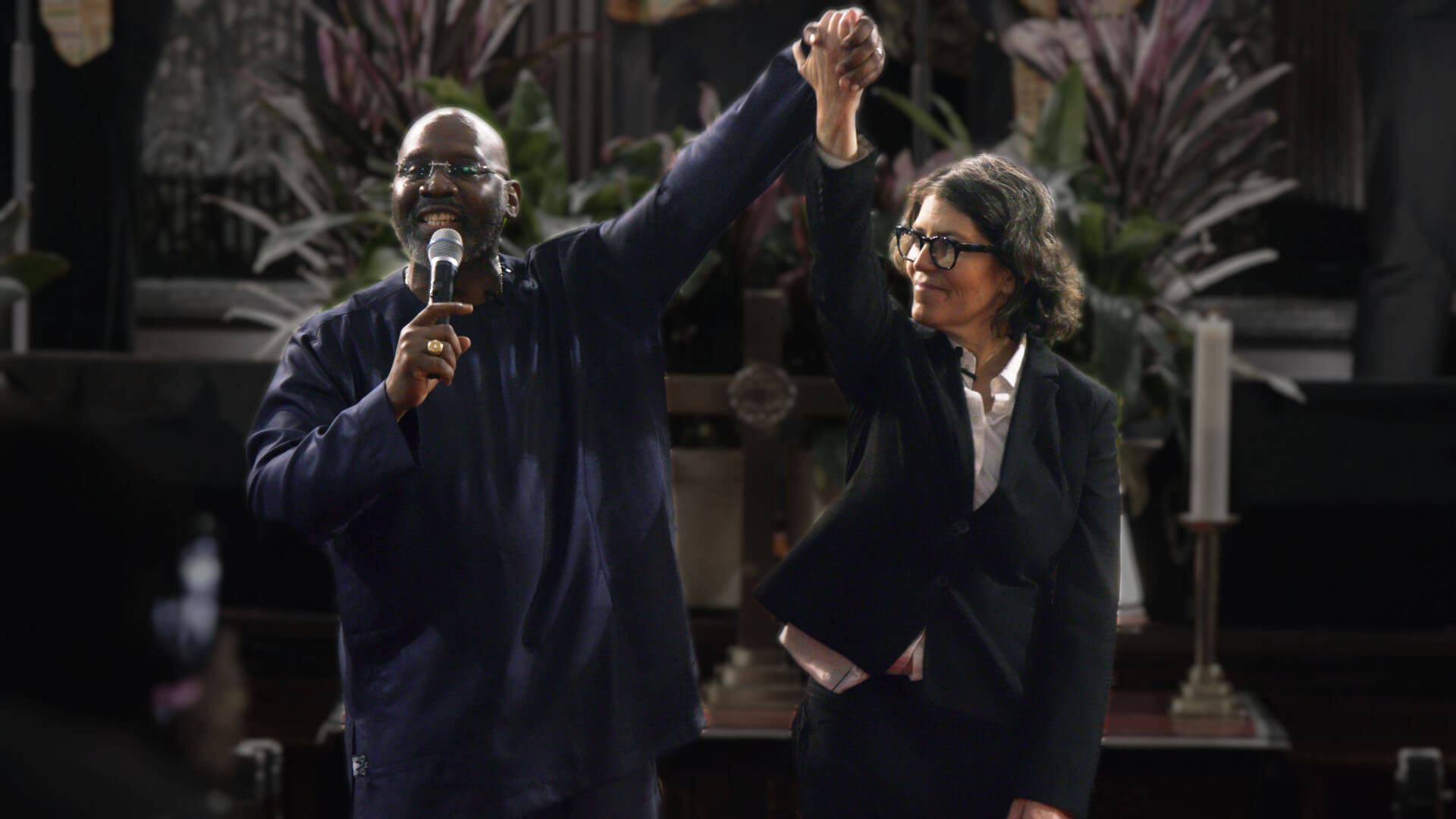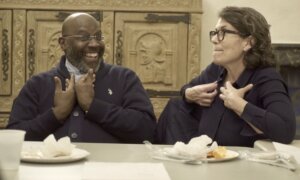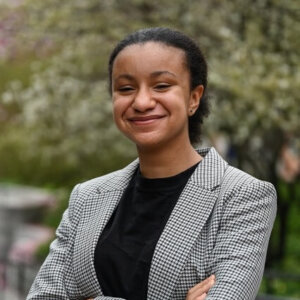An inspiring documentary shows the power of Black-Jewish unity
Ondi Timoner’s ‘All God’s Children’ shows the rewards — and challenges — of intercultural solidarity

The Rev. Robert M. Waterman and Rabbi Rachel Timoner, the subjects of All God’s Children. Courtesy of Ondi Timoner
Unity between Black and Jewish Americans seems natural: They are the two groups in the United States that have faced the most violence in their homes of worship. But, as a new documentary shows, racial and religious differences can be hard to work past.
All God’s Children, the latest film from director Ondi Timoner, known for the award-winning films Dig! and We Live In Public, follows her sister Rabbi Rachel Timoner, rabbi of Congregation Beth Elohim, and Reverend Robert Waterman of Antioch Baptist Church as they bring their two Brooklyn-based congregations together to address antisemitism and racism within the community.
We follow the congregants of CBE and Antioch over the course of five years through roundtable discussions, trips to the African American History Museum and the Holocaust Memorial Museum in D.C., and exchanges of spiritual practices. Through individual interviews, we learn more about where the subjects are coming from: Race riots had a profound impact on Rabbi Timoner when she was growing up in Miami, driving her to pursue social justice work; when Reverend Waterman was a teenager, he worked on a field where he was only allowed to say four phrases to his white employers: “Yes, ma’am,” “No, ma’am,” “Yes, sir,” “No, sir.”
These profiles are crucial to understanding conflicts that arise, such as members of CBE feeling uncomfortable about congregants from Antioch coming to their synagogue with a “Jesus” flag, or when members of Antioch feel silenced when Rabbi Timoner expresses frustration over theological differences.
The film could have painted a simpler picture of intercultural unity, showing only the scenes of CBE and Antioch members smiling over bowls of matzo ball soup and plates of yams in a food exchange at a seder. But Timoner refuses to shy away from how difficult and emotional the work can be, which is what makes the film so powerful. At times, audience members will surely find themselves cringing in their seats, but sitting through those tense parts is worth it to reach the inspiring conclusion. And that is the exact point of the film: If you are able to overcome the difficulties that accompany working with someone with different beliefs than your own, the outcome can be unexpectedly rewarding.
‘This is the beginning of the next part of the relationship’
CBE and Antioch initially came together to address rampant deed theft in Crown Heights, Brooklyn, a neighborhood with a history of high tension between its Black and Jewish residents. Deed theft is a crime in which homeowners — often those who are Black — are coerced or tricked into signing over the rights to their property to a — oftentimes white and sometimes Jewish — fraudster. When the communities began meeting in 2019, deed theft was not illegal in the state of New York.
As Ondi Timoner pointed out to me in a Zoom interview, although plenty of non-Jewish white people engage in deed theft, the ones who are easiest to blame because they are most visibly different are Hasidic Jews.
Rabbi Timoner and Reverend Waterman knew it would take a long time to get their two communities to connect with each other before diving into the work of lobbying for legislation criminalizing deed theft. When white members of CBE first appeared at Antioch, congregants thought they had lost the building. It was only after becoming familiar with faces from CBE that Antioch’s congregants believed their church was not at risk of being taken from them.
Coming into the film, I expected the biggest hurdle between the two communities would be race. However, the biggest point of contention ended up being religion.
At Antioch’s Easter service in 2022, members of CBE were present for the church’s reenactment of the crucifixion and resurrection of Jesus which featured a Jewish caricature in a tallis, laughing and gloating while Jesus is nailed to the cross.
“Knowing that my congregants had come because they trusted me and fearing that I had brought them into a situation where they were going to be harmed, I really felt like maybe I’ve done something really wrong,” Rabbi Timoner told me.
At a subsequent meeting between CBE and Antioch, when Rabbi Timoner expressed her frustration with the reenactment, some members of Antioch were offended that an outsider — particularly a white woman — would accuse them of bigotry.
“We’ve been doing this for a lifetime,” Reverend Waterman told me. “And when you don’t know [what antisemitism is] how are you held accountable to that which you don’t know?”
In an era obsessed with cancel culture, having the willingness to continue a conversation with someone who has offended you is rare. But both groups agreed to have a third-party moderator help them move forward.

“Even if someone says something antisemitic or does something antisemitic, that’s not the end of the relationship. That is the beginning of the next part of the relationship, where you have the courage to talk about it and to stay connected,” Rabbi Timoner told me. “We have to give them the benefit of the doubt and give them a chance to hear what our experience is while also listening deeply to their experience.”
Intercultural unity leads to change
In 2023, partially as a result of CBE and Antioch’s lobbying efforts, New York Senator Zellnor Myrie (D), who attended the premiere of All God’s Children at the DOC NYC Film Festival and moderated the Q&A, introduced a bill making deed theft a crime. The bill was signed into law in November 2023.
Since the completion of the film, congregants of CBE and Antioch have continued to meet and have community dinners. The work of bridging divisions is a constant process and will be critical in the coming years.
“The timing of it does seem like it’s a balm for folks to understand like, hey, we don’t have to agree,” Ondi Timoner told me. “We just need to not walk away and really try to listen and try to respect one another and love one another.”
The film All God’s Children will have a public screening and Q&A at Congregation Beth Elohim Wednesday, Dec. 11, at 6:30 p.m. There will also be a public screening at Antioch Baptist Church on MLK Day 2025, Jan. 20. Community screenings of All God’s Children are available upon request. Visit InterloperFilms.com for more information.
A message from our Publisher & CEO Rachel Fishman Feddersen

I hope you appreciated this article. Before you go, I’d like to ask you to please support the Forward’s award-winning, nonprofit journalism so that we can be prepared for whatever news 2025 brings.
At a time when other newsrooms are closing or cutting back, the Forward has removed its paywall and invested additional resources to report on the ground from Israel and around the U.S. on the impact of the war, rising antisemitism and polarized discourse.
Readers like you make it all possible. Support our work by becoming a Forward Member and connect with our journalism and your community.
— Rachel Fishman Feddersen, Publisher and CEO




























